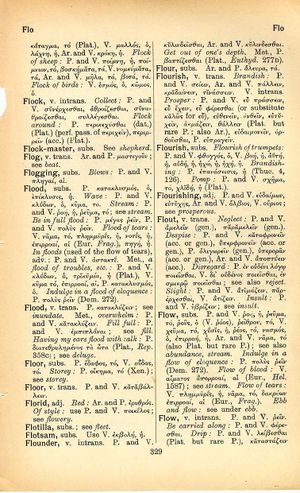flounder: Difference between revisions
From LSJ
καὶ τῇ ὧν λέγεις καὶ φθέγγῃ ἡρωικῇ ἀληθείᾳ ἀρκούμενος, εὐζωήσεις → and satisfied with heroic truth in every word and sound which you utter, you will live happy
m (Text replacement - "<b class="b2">Euthyd.</b>" to "''Euthyd.''") |
m (Woodhouse1 replacement) |
||
| Line 1: | Line 1: | ||
{{Woodhouse1 | {{Woodhouse1 | ||
|Text=[[File:woodhouse_329.jpg|thumb|link={{filepath:woodhouse_329.jpg}}]] | |Text=[[File:woodhouse_329.jpg|thumb|link={{filepath:woodhouse_329.jpg}}]] | ||
P. and V. κυλινδεῖσθαι. Ar. and V. κυλινδεσθαι. | ===verb intransitive=== | ||
[[prose|P.]] and [[verse|V.]] [[κυλινδεῖσθαι]]. [[Aristophanes|Ar.]] and [[verse|V.]] [[κυλινδεσθαι]]. | |||
Get out of one's depth. | Get out of one's depth. | ||
Met. P. βαπτίζεσθαι ( | Met. [[prose|P.]] [[βαπτίζεσθαι]] ([[Plato]], ''Euthyd.'' 277D). | ||
}} | }} | ||
Revision as of 09:17, 20 May 2020
English > Greek (Woodhouse)
verb intransitive
P. and V. κυλινδεῖσθαι. Ar. and V. κυλινδεσθαι. Get out of one's depth. Met. P. βαπτίζεσθαι (Plato, Euthyd. 277D).

